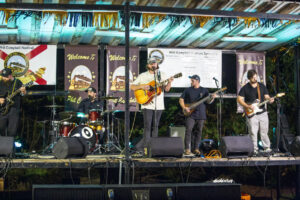The law of unintended consequences
By Staff
Craig Ziemba / guest columnist
Feb. 29, 2004
Back when I was a bachelor living at Dalewood Lake, I came home one afternoon and saw the following: my roommate's motorcycle on the front porch with one end of a garden hose duct taped to the exhaust pipe and the other end stuck into a hole in the front wall, hundreds of dead yellow jackets scattered all over the first floor, and the contents of our septic tank strewn all over the carpet.
Through the sliding glass door, I saw my roommate Dave sitting dejectedly on the dock shooting his BB gun straight up into the air trying to hit himself on the head.
When he turned to answer me, his face was swollen and covered with red welts. "I heard a buzzing in the wall," he explained. "So I tapped on the Sheetrock and yellow jackets came pouring out and tore me up. I got even with them by smoking them out with my motorcycle, but when I tried to flush them all down the toilet it backed up and flooded out the house."
Loud buzzing
There's a very loud buzzing in the wall of America's culture. Last week as state legislators across the country debated the legal definition of marriage, the mayor of San Francisco tapped a hole in the wall by ignoring state law and issuing marriage licenses to homosexuals.
He claimed as his justification the Fourteenth Amendment, which states that, "No state shall make or enforce any law which shall abridge the privileges or immunities of citizens of the United States; nor shall any State deprive any person of life, liberty, or property, without due process of law; nor deny to any person within its jurisdiction the equal protection of the laws."
According to the mayor, by denying homosexuals the right to marry, the state of California deprived them equal protection under the law. Does he have a valid point and, if so, where will this line of reasoning lead?
I disagree with the mayor's constitutional logic. By defining marriage as between a man and a woman, a state does not deny its citizens equal protection under the laws, and here's why: No one is allowed to marry a person of the same sex. Whites can't; blacks can't; you can't; I can't.
We are all equally prohibited from that same conduct, much in the same way that we are all equally prohibited from running stop signs. If some group in the future appears before a court and claims that they really, really want to run stop signs as part of their self-expression, that court should tell them, "No." That wouldn't be discrimination, would it?
Follow the argument
Legalities aside, though, what happens if we follow the mayor's argument to its logical conclusion? If the state can't define marriage, then anything goes anything. A woman could marry a woman, one man could marry six women and 10-year-old triplets could marry a flock of sheep.
Without a clear definition of marriage, how do we determine who the spouse is when it comes to questions regarding health care benefits, life insurance, child custody or filing taxes?
More importantly, though, what are the long-term effects of rejecting the marital ideal given by our Lord when He brought Adam and Eve together for the first time and said, "Therefore a man shall leave his father and mother, and shall cleave unto his wife, they shall be one flesh." Genesis 2:24.
Do we really want to deal with the consequences?
Craig Ziemba is a pilot who lives in Meridian. His book, "Boondoggle," is available at Meridian area Bible Bookstores.










